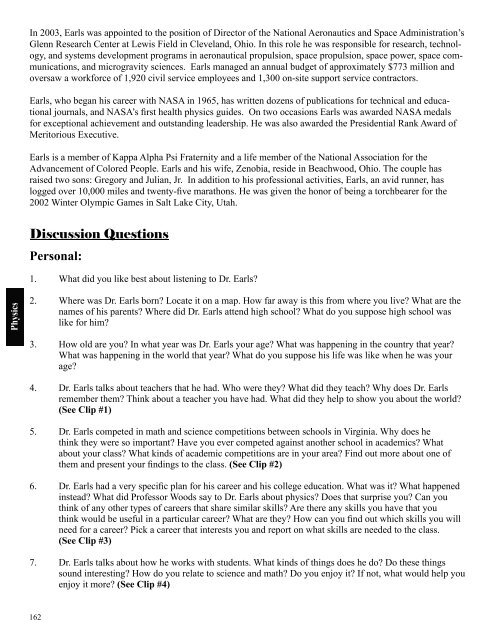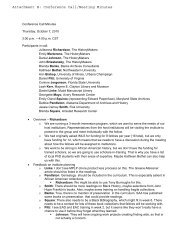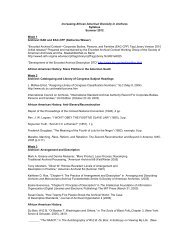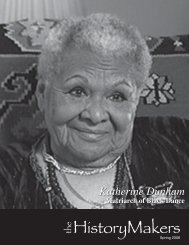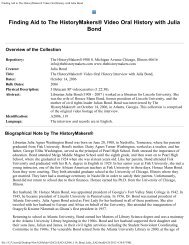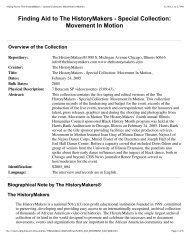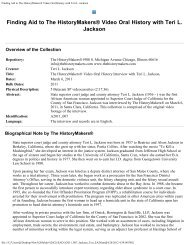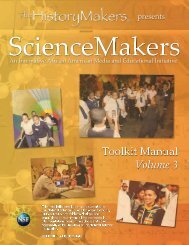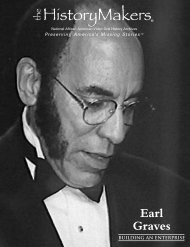ScienceMakers Toolkit Manual - The History Makers
ScienceMakers Toolkit Manual - The History Makers
ScienceMakers Toolkit Manual - The History Makers
Create successful ePaper yourself
Turn your PDF publications into a flip-book with our unique Google optimized e-Paper software.
Physics<br />
In 2003, Earls was appointed to the position of Director of the National Aeronautics and Space Administration’s<br />
Glenn Research Center at Lewis Field in Cleveland, Ohio. In this role he was responsible for research, technology,<br />
and systems development programs in aeronautical propulsion, space propulsion, space power, space communications,<br />
and microgravity sciences. Earls managed an annual budget of approximately $773 million and<br />
oversaw a workforce of 1,920 civil service employees and 1,300 on-site support service contractors.<br />
Earls, who began his career with NASA in 1965, has written dozens of publications for technical and educational<br />
journals, and NASA’s fi rst health physics guides. On two occasions Earls was awarded NASA medals<br />
for exceptional achievement and outstanding leadership. He was also awarded the Presidential Rank Award of<br />
Meritorious Executive.<br />
Earls is a member of Kappa Alpha Psi Fraternity and a life member of the National Association for the<br />
Advancement of Colored People. Earls and his wife, Zenobia, reside in Beachwood, Ohio. <strong>The</strong> couple has<br />
raised two sons: Gregory and Julian, Jr. In addition to his professional activities, Earls, an avid runner, has<br />
logged over 10,000 miles and twenty-fi ve marathons. He was given the honor of being a torchbearer for the<br />
2002 Winter Olympic Games in Salt Lake City, Utah.<br />
Discussion Questions<br />
Personal:<br />
1. What did you like best about listening to Dr. Earls?<br />
2. Where was Dr. Earls born? Locate it on a map. How far away is this from where you live? What are the<br />
names of his parents? Where did Dr. Earls attend high school? What do you suppose high school was<br />
like for him?<br />
3. How old are you? In what year was Dr. Earls your age? What was happening in the country that year?<br />
What was happening in the world that year? What do you suppose his life was like when he was your<br />
age?<br />
4. Dr. Earls talks about teachers that he had. Who were they? What did they teach? Why does Dr. Earls<br />
remember them? Think about a teacher you have had. What did they help to show you about the world?<br />
(See Clip #1)<br />
5. Dr. Earls competed in math and science competitions between schools in Virginia. Why does he<br />
think they were so important? Have you ever competed against another school in academics? What<br />
about your class? What kinds of academic competitions are in your area? Find out more about one of<br />
them and present your fi ndings to the class. (See Clip #2)<br />
6. Dr. Earls had a very specifi c plan for his career and his college education. What was it? What happened<br />
instead? What did Professor Woods say to Dr. Earls about physics? Does that surprise you? Can you<br />
think of any other types of careers that share similar skills? Are there any skills you have that you<br />
think would be useful in a particular career? What are they? How can you fi nd out which skills you will<br />
need for a career? Pick a career that interests you and report on what skills are needed to the class.<br />
(See Clip #3)<br />
7. Dr. Earls talks about how he works with students. What kinds of things does he do? Do these things<br />
sound interesting? How do you relate to science and math? Do you enjoy it? If not, what would help you<br />
enjoy it more? (See Clip #4)<br />
162


